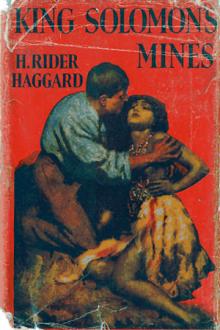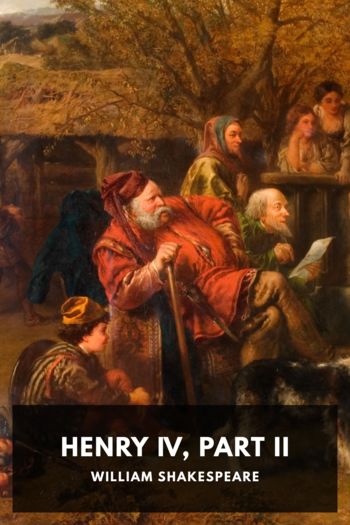King Solomon’s Mines, H. Rider Haggard [best mystery novels of all time TXT] 📗

- Author: H. Rider Haggard
Book online «King Solomon’s Mines, H. Rider Haggard [best mystery novels of all time TXT] 📗». Author H. Rider Haggard
Now we saw what it was. On the grass there lay a sable antelope bull—the most beautiful of all the African antelopes—quite dead, and transfixed by its great curved horns was a magnificent black-maned lion, also dead. Evidently what had happened was this: The sable antelope had come down to drink at the pool where the lion—no doubt the same which we had heard—was lying in wait. While the antelope drank, the lion had sprung upon him, only to be received upon the sharp curved horns and transfixed. Once before I saw a similar thing happen. Then the lion, unable to free himself, had torn and bitten at the back and neck of the bull, which, maddened with fear and pain, had rushed on until it dropped dead.
As soon as we had examined the beasts sufficiently we called the Kafirs, and between us managed to drag their carcases up to the scherm. After that we went in and lay down, to wake no more till dawn.
With the first light we were up and making ready for the fray. We took with us the three eight-bore rifles, a good supply of ammunition, and our large water-bottles, filled with weak cold tea, which I have always found the best stuff to shoot on. After swallowing a little breakfast we started, Umbopa, Khiva, and Ventvögel accompanying us. The other Kafirs we left with instructions to skin the lion and the sable antelope, and to cut up the latter.
We had no difficulty in finding the broad elephant trail, which Ventvögel, after examination, pronounced to have been made by between twenty and thirty elephants, most of them full-grown bulls. But the herd had moved on some way during the night, and it was nine o’clock, and already very hot, before, by the broken trees, bruised leaves and bark, and smoking droppings, we knew that we could not be far from them.
Presently we caught sight of the herd, which numbered, as Ventvögel had said, between twenty and thirty, standing in a hollow, having finished their morning meal, and flapping their great ears. It was a splendid sight, for they were only about two hundred yards from us. Taking a handful of dry grass, I threw it into the air to see how the wind was; for if once they winded us I knew they would be off before we could get a shot. Finding that, if anything, it blew from the elephants to us, we crept on stealthily, and thanks to the cover managed to get within forty yards or so of the great brutes. Just in front of us, and broadside on, stood three splendid bulls, one of them with enormous tusks. I whispered to the others that I would take the middle one; Sir Henry covering the elephant to the left, and Good the bull with the big tusks.
“Now,” I whispered.
Boom! boom! boom! went the three heavy rifles, and down came Sir Henry’s elephant dead as a hammer, shot right through the heart. Mine fell on to its knees and I thought that he was going to die, but in another moment he was up and off, tearing along straight past me. As he went I gave him the second barrel in the ribs, and this brought him down in good earnest. Hastily slipping in two fresh cartridges I ran close up to him, and a ball through the brain put an end to the poor brute’s struggles. Then I turned to see how Good had fared with the big bull, which I had heard screaming with rage and pain as I gave mine its quietus. On reaching the captain I found him in a great state of excitement. It appeared that on receiving the bullet the bull had turned and come straight for his assailant, who had barely time to get out of his way, and then charged on blindly past him, in the direction of our encampment. Meanwhile the herd had crashed off in wild alarm in the other direction.
For a while we debated whether to go after the wounded bull or to follow the herd, and finally deciding for the latter alternative, departed, thinking that we had seen the last of those big tusks. I have often wished since that we had. It was easy work to follow the elephants, for they had left a trail like a carriage road behind them, crushing down the thick bush in their furious flight as though it were tambouki grass.
But to come up with them was another matter, and we had struggled on under the broiling sun for over two hours before we found them. With the exception of one bull, they were standing together, and I could see, from their unquiet way and the manner in which they kept lifting their trunks to test the air, that they were on the lookout for mischief. The solitary bull stood fifty yards or so to this side of the herd, over which he was evidently keeping sentry, and about sixty yards from us. Thinking that he would see or wind us, and that it would probably start them off again if we tried to get nearer, especially as the ground was rather open, we all aimed at this bull, and at my whispered word, we fired. The three shots took effect, and down he went dead. Again the herd started, but unfortunately for them about a hundred yards further on was a nullah, or dried-out water track, with steep banks, a place very much resembling the one where the Prince Imperial was killed in Zululand. Into this the elephants plunged, and when we reached the edge we found them struggling in wild confusion to get up the other bank, filling the air with their screams, and trumpeting as they pushed one another aside in their selfish panic, just like so many human beings. Now was our opportunity,





Comments (0)